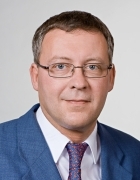
Prof. Dr.-Ing. Hartmut Spliethoff
Academic Career and Research Areas
The research of Professor Spliethoff (b. 1960) focuses on the development and optimization of central and decentralized energy conversion systems and plants. Through a combination of theory and experimentation, he explores ways to improve the efficiency and flexibility of thermal power plants, convert solid fossil fuels and biomass, capture carbon dioxide and improve the efficiency of low temperature heat conversion.
After studying mechanical engineering at the Universities of Kaiserslautern and Stuttgart, Prof. Spliethoff did his doctorate (1992) and lecturer qualification (1999) in Stuttgart. Prior to his appointment as full professor at TUM, he was professor and Chair of Energy Technology at Delft University of Technology, the Netherlands, until 2004. He is Scientific Director of Department 1 of the Bavarian Center for Applied Energy Research (ZAE). Prof. Spliethoff is a member of the advisory council of the Association of Large Power Plant Operators (VGB). Since 2004, he has served as Superintendent of Research at the International Flame Research Foundation.
Key Publications
Buttler A, Spliethoff H: "Current status of water electrolysis for energy storage, grid balancing and sector coupling via power-to-gas and power-to-liquids: A review". Renewable and Sustainable Energy Reviews. 2018; 82(3): 2440-2454.
AbstractKleinhans U, Wieland C, Frandsen FJ, Spliethoff H: "Ash formation and deposition in coal and biomass fired combustion systems: Progress and challenges in the field of ash particle sticking and rebound behavior". Progress in Energy and Combustion Science. 2018; 68: 65-168.
AbstractKunze C, Spliethoff H: "Assessment of oxy-fuel, pre- and post-combustion-based carbon capture for future IGCC plants". Applied Energy. 2012; 94: 109-116.
AbstractSpliethoff H: Power Generation from Solid Fuels. Berlin Heidelberg: Springer, 2010.
AbstractSchuster A, Karellas S, Kakaras E, Spliethoff H: "Energetic and economic investigation of Organic Rankine Cycle applications". Applied Thermal Engineering. 2009; 29(8-9); 1809-1817.
Abstract